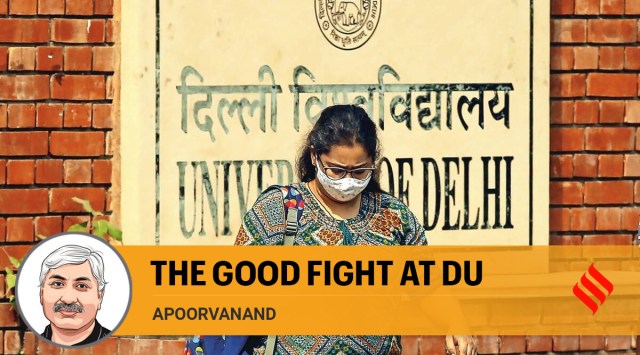- India
- International
What Delhi University’s new vice-chancellor needs to do
Apoorvanand writes: He must restore autonomy of the university, create and protect spaces for free minds to flourish.
 The academic community of the university is deeply divided. Factions take pride in their political — rather than professional — identities.
The academic community of the university is deeply divided. Factions take pride in their political — rather than professional — identities.The University of Delhi is lucky that it did not have to wait for a vice-chancellor, like JNU. Yogesh Singh was recently appointed the new VC. The university is not familiar with him nor does he know the university. It is strange that in the selection process of the most important person of the university, the university community is not involved in any meaningful way. This is not how the leadership question is dealt with in the best universities of the world but obviously, we have other aspirations — like being a good “nationalist” university.
The first utterances of the new VC, however, raise hope. He assures us that he would be the VC of all members of the university community. Our previous VCs, unfortunately, patronised particular teacher factions depending upon their own leanings or convenience or allowed themselves to be patronised by them. How can one forget the shameful episode of the suspension of the previous VC, who was trapped in the fight between factional interests?
The academic community of the university is deeply divided. Factions take pride in their political — rather than professional — identities. DUTA elections are fought on this basis and clients are cultivated. It has resulted in a loss of collegiality at the university. It makes the task of a VC easy and difficult at the same time. The new VC, if we trust his words, would hopefully bring the university community together.
The second assurance is even more significant. Singh says recruitment has to be a continuous process and not an episodic event. He has also said that one of the most important tasks of a VC is to make good recruitments. After all, it is the teacher who gives the university its identity. Unfortunately, in DU, recruitment has been hostage to political factionalism. Appointment to nearly 4,500 vacant teaching posts must start forthwith. The culture of ad hoc appointments, again promoted by the factional teacher politics and a lethargic administration, is ruining the university and the lives of young aspiring teachers. The VC needs to break this logjam but it has to be done if the university is to survive as an academic space.
My colleague Prem Singh pointed out that when we discuss recruitment, the non-teaching section of the university is forgotten. It is hugely overloaded with work as there is an acute shortage of staff due to lack of recruitment for a long time. For a university to run efficiently, you need to have a self-assured supporting staff. The VC should pay attention to this aspect.

Yogesh Singh said in an interview that the VC would be guided by the deans and department heads. He also said he would abide by the ACT, its rules, regulations and statutes. This is reassuring.
It is urgent to restore autonomy to the heads and deans, which means activating the basic academic, administrative units. The faculty bodies and the academic councils need to revitalise themselves and do their job. The heads and deans mostly act as the rubber stamp of the VC whereas they have a duty to give him honest academic advice. They seldom do this. To be in his good books, they only nod their heads in agreement or hound the critics.
The episode of the imposition of the Four-Year Undergraduate Programme (FYUP) in 2013 and its rollback is only one example. The most recent decision of changing the structure of the undergraduate programme and implementing FYUP with multiple entry-exit points was done keeping in abeyance all processes of academic decision-making. It was shocking that nearly all the deans and heads together robbed their faculty of the right to have, and express, academic opinion. The promise of the VC can be realised only if the deans and heads find their moral spines.
The VC, hopefully, will strive to restore academic credibility to the syllabus and curriculum processes, make them stable, not vulnerable to experiments like CBCS, learning outcome-based curriculum, etc. He also needs to assert and protect the right of the university to make its own academic decisions, not follow diktats from above.
The most encouraging remark of Singh was that every institution has its own atma or soul. So, the leaders need to approach the institution with humility and not kill this atma. You can even call it the individuality or personality of the institution. We have seen this atma being butchered in JNU where a VC, insensitive to its unique character, created engineering, medical, management schools, destroying its character as a social science university.
Delhi University lives in its colleges. Their glory needs to be brought back. It is not only the classes but theatre, seminars, discussions that make undergraduate life vibrant and exciting. Unfortunately, the aggression and violence displayed regularly by the student-wing of the ruling party has made colleges nervous and slowly, life has ebbed out of them. We have seen invitations to speakers revoked, programmes cancelled in the last seven years. Teacher orientation and refreshment programmes are run on the ideological lines of the ruling party and do not serve any academic purpose.
Apart from this, another huge responsibility of the VC is to keep the university afloat in the face of severe cuts in fund allocation. He will have to persuade the UGC and government to give adequate funds to the university to keep its library, laboratories functional, commensurate with international standards.
The governance of a university is challenging, as it is to create and ensure safe spaces for free and autonomous minds to grow. The leader, in doing so, has to fight with pressures from society and political power. It is, however, a good fight.
This column first appeared in the print edition on October 23, 2021 under the title ‘The good fight at DU’. The writer teaches Hindi at Delhi University.
40 Years Ago
EXPRESS OPINION
Best of Express
More Explained
Apr 18: Latest News
- 01
- 02
- 03
- 04
- 05










































